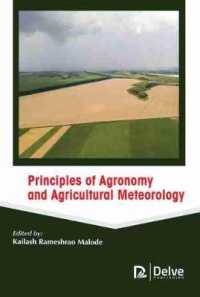- ホーム
- > 洋書
- > ドイツ書
- > Social Sciences, Jurisprudence & Economy
- > Politics, Society, Work
- > social science
Description
(Short description)
Dieses Buch interpretiert Armut, Ungleichheit und Ungerechtigkeit im Licht des christlichen Glaubens. Diese Begriffe fordern den christlichen Humanismus intellektuell heraus. Die Autoren greifen als führende Wissenschaftler auf diesem Gebiet diese Herausforderung auf. Das Buch beginnt mit einer Reihe von Kapiteln über die ökonomischen Dimensionen von Armut, Ungleichheit und Ungerechtigkeit und wendet sich im zweiten Teil den philosophischen und theologischen Aspekten zu. Obwohl streng akademisch fundiert, bieten die Ideen in diesem Buch zugleich eine transformative Perspektive.
(Table of content)
Part I: PovertyRoger MyersonPublic Political Capital for Economic DevelopmentJoseph KaboskiChristian Humanism and Poverty in the WorldGerhard KruipEthical and Theological Aspects of Poverty According to Pope FrancisMarcelo F. ResicoPoverty, its Causes and Orientations to Remedy. A Social Market Economy Point of ViewPart II: Injustice and InequalityMaria Sophia AguirreInequality and Growth: Exploring a Relational DimensionDaniel HaunThrough the Eyes of Children: A Develompmental Psychologist's View on FairnessBruce D. BakerGleaning as a Transformational Business Model for Solidarity with the Poor and MarginalizedBrian GriffithsThe Challenge of InequalityMartin SchlagJustice and Partiality for the Poor and MarginalizedJohn BuchmannWhose Injustice? Which Inequality? Trajectories in Catholic Social TeachingArnd KüppersEquality in Catholic Social Teaching and the Concept of Social JusticePart III: Case studiesDomènec Melé, Alejandro Moreno-Salamanca and Juan Manuel ParraA Hybrid Corporate Community Involvement in an Impoverished Neighborhood: Analysis of a Case Study from the Catholic Social Teaching PerspectiveOdra Angélica Saucedo DelgadoThe Moral Content of the Reciprocity Systems Amongst Poor Families: A Case Study in Three Townships Located Within Mexico City's Metropolitan Area
(Text)
Both in religious and in secular culture there is an acute awareness that poverty, destitution, and misery should be eliminated, and that it is possible to achieve this goal. Despite this common aim, strategies for fighting poverty vary widely among the disciplines. This book interprets poverty in the light of Christian faith and ventures beyond the dual public-private model. Pope Francis has called on business leaders around the world to spread a new mindset in business that acknowledges the poor and the marginalized. In doing so, he deplores inequality and injustice. These concepts pose an intellectual challenge to Christian humanism, which the authors, leading scholars on the subject, take up. The book opens with a series of chapters on the economic dimensions of poverty, inequality, and injustice, and turns to the philosophical and theological aspects in its second part. Even though rigorously academic, the ideas in this book are transformative. The social market economy places the human person at the center of the economy, and it offers a model that can be implemented, under this or other names, in many parts of the world.






